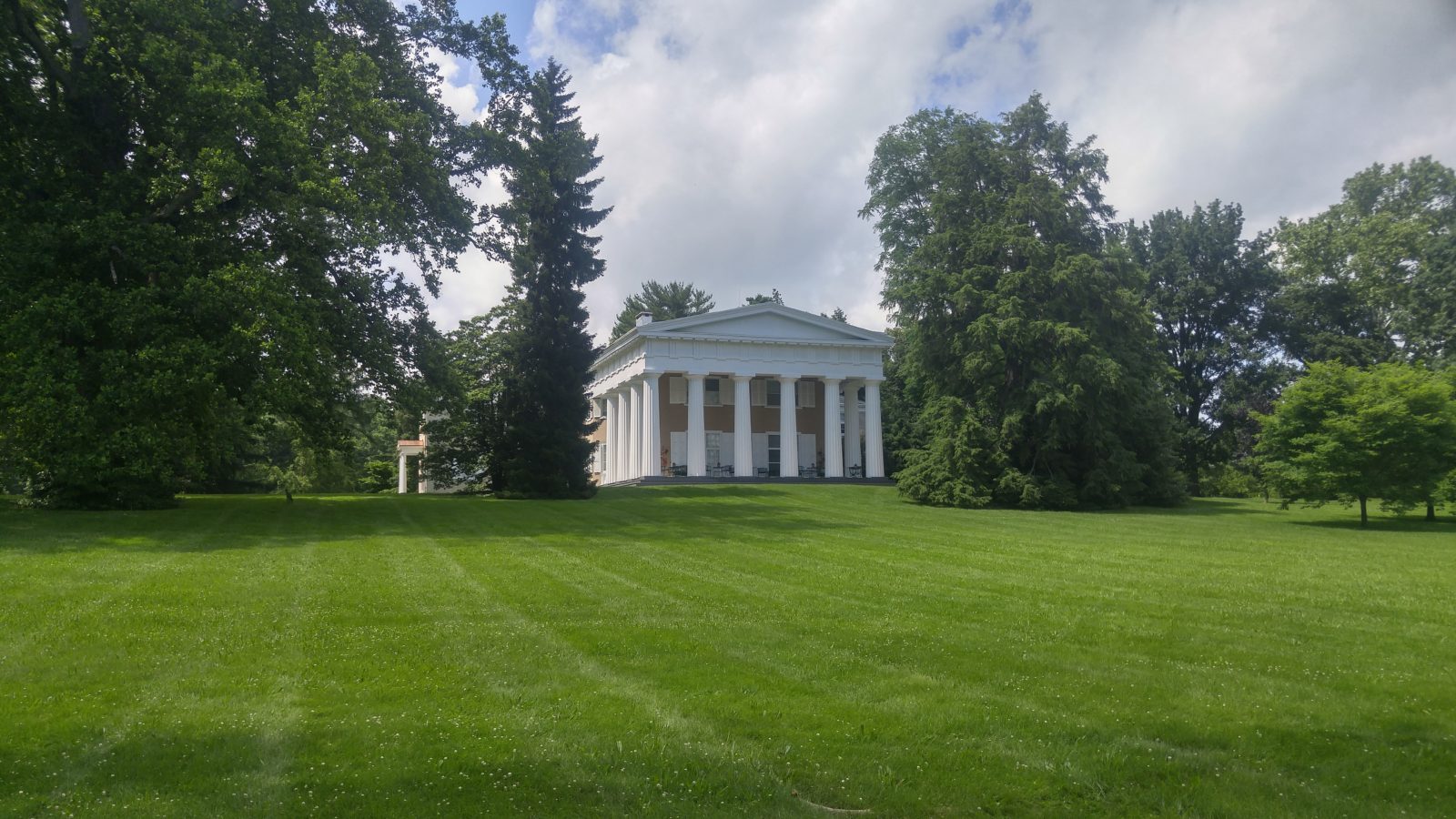One family’s patriotic legacy is recalled at fabulous Andalusia.
Years ago I worked with a young newspaper reporter engaged to a Philadelphia woman with the last name Biddle. Chris told me he was going through the legal process of changing his last name to hers. He proudly boasted he liked the Biddle name for its history and for love of his bride. As a West Coast transplant, I wasn’t up on Biddle lore. I thought maybe it was the family behind Philly jewelers Bailey, Banks & Biddle. Skip ahead a few years and Mary Anne and I were invited to a concert by the Philadelphia Youth Orchestra in the walled rose garden of a 225-acre domain known as Andalusia. It wasn’t just any manse however. It was the Biddle family compound on the Delaware River in Bensalem.
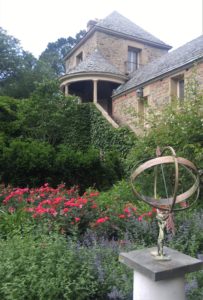
Generations had lived there, establishing a legacy hard to summerize briefly. But I’ll try.
Andalusia was John Craig’s idea after his father died of Yellow Fever in Philadelphia in 1795. Back then, it was prudent to escape the city in the summer due to the mosquito-born pestilence. The site chosen by Craig was in the rural safety of Bucks County. There he built a large country house on property called Andalusia after his lucrative import/export business with Spain.
Young Nicholas Biddle inherited the property in 1814 through marriage to Craig’s only daughter Jane. Nick, 28, was a financier of growing influence, a man born the prodigy of a prominent Philadelphia family. His father Charles, a captain in the merchant marine during the Revolutionary War, was a close friend of Benjamin Franklin and served as vice president of the Pennsylvania colony. Uncle Nicholas was a Continental Navy ship’s captain who lost his life in battle with an English warship off Barbados during the American Revolution. His uncle Edward was a lawyer, soldier and delegate to the Continental Congress. His older brother James became a U.S. Navy commodore who opened China to U.S. trade. Younger brother Thomas was a hero of the War of 1812.
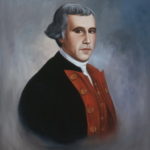
Among 9 siblings, Nicholas was intellectually gifted. He entered the University of Pennsylvania at age 10 but at 13 was too young to receive a degree. He transferred to Princeton where he graduated at 15. He took up studies of the law and traveled extensively in Europe. He attended the coronation of Napoleon, helped audit the Louisiana Purchase in Paris, and served as secretary to U.S. foreign minister James Monroe in England. Just 21, he returned to Philadelphia in 1807 to practice law and contribute articles and poetry to the magazine Portfolio. He also edited Lewis and Clark’s report to Thomas Jefferson on their epic exploration of the West.
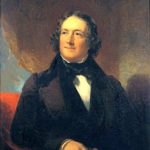
Biddle’s rise to power accelerated in 1819 as director and eventual president of the Second Bank of the United States in Philadelphia. He effectively formalized the nation’s currency and credit system and directed the central bank for years. Politically, he raised money for allies in Congress. Few dared cross him until the presidency of Andrew Jackson who campaigned relentlessly against the bank as a financial oligarchy. Jackson vetoed Congress’ re-authorization of the bank charter in 1832, removed all U.S. deposits from Biddle’s control and deregulated banking throughout the country. Those moves initiated the Panic of 1837, seven years of national deflation and business collapses without a central bank to stabilize the situation.
In the midst of his battle with Jackson, Biddle and his wife who had six children made major renovations to the main house at Andalusia. As an advocate of Greek architecture from his travels in Europe, Biddle once proclaimed, “There are two truths in the world – the Bible and Greek architecture.”
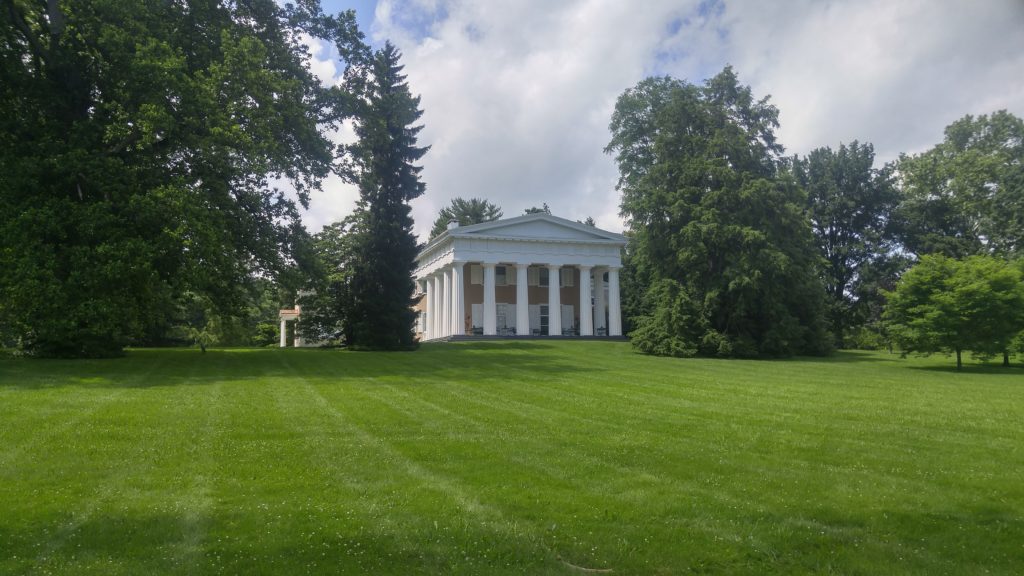
To achieve his visage of “a Greek temple on the hill” in 1833, he hired architect Thomas Ustick Walter who designed the U.S. Capitol dome. Massive Doric columns soon enwrapped the original Craig home with new two-story wings fanning out from it. The resulting manor hall was an alabaster vision seen for miles by ships on the Delaware and from the distant New Jersey shore. The Biddles entertained many notables including President John Quincy Adams, Sen. Daniel Webster, the Marquis de Lafayette and Bordentown’s Joseph Bonaparte, the former King of Spain.
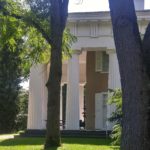
Biddle in his latter years raised race horses and Alderney cattle at Andalusia. He also experimented in agriculture including harvesting exceptional table grapes from hothouses enclosed by high stone walls – today’s rose garden. He died at home in 1844 at 58.
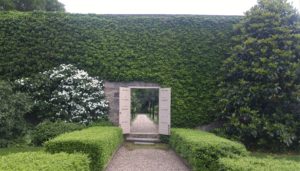
Andalusia remains in the Biddle family. The lavishly furnished great mansion is preserved as a “museum house” by the Andalusia Foundation which hosts tours of the home and grounds. Proceeds go to upkeep. A visit is to gain an appreciation of the Biddle family, particularly Nicholas Biddle who famously said of the federal government: “Nothing but widespread suffering will produce any effect on Congress.”
Sources for this column include “History of Bucks County” by W.W.H. Davis published in 1905 and the Andalusia Foundation’s website at www.andalusiapa.org. To plan a tour, visit the foundation’s website.

